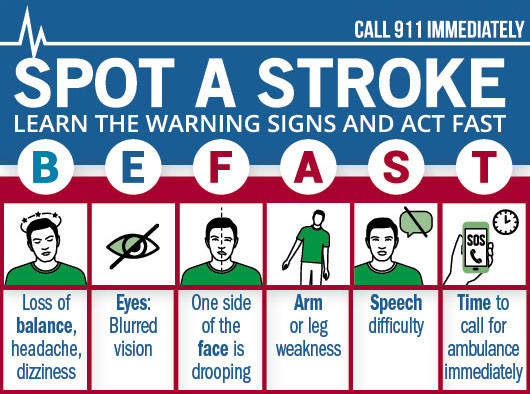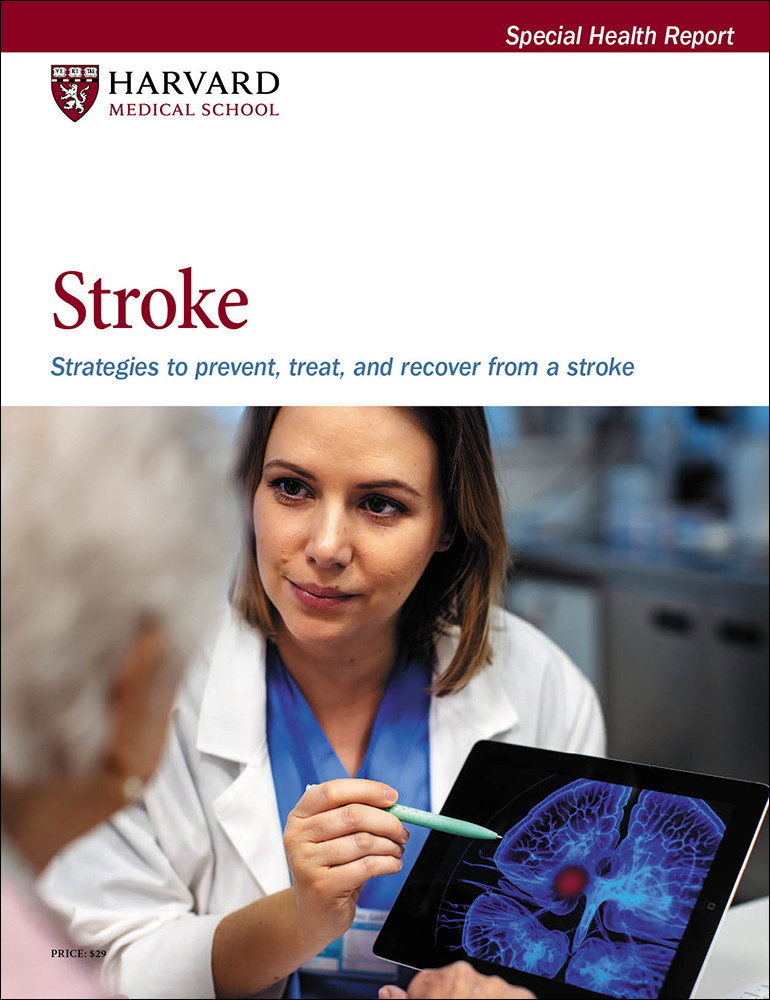How to recognize and respond to a "warning" stroke
A transient ischemic attack means you're at risk for a full-blown stroke. Seek emergency care, even if your symptoms are short-lived.
- Reviewed by Christopher P. Cannon, MD, Editor in Chief, Harvard Heart Letter; Editorial Advisory Board Member, Harvard Health Publishing

A temporary blockage of blood flow to the brain, known as a transient ischemic attack (TIA), can cause a range of unsettling symptoms, including slurred speech or arm weakness. The symptoms appear suddenly but usually last less than five minutes, which is why TIAs are often ignored or missed.
Although TIAs are often referred to as "ministrokes," the term "warning stroke" is actually more accurate. A TIA can be a harbinger of a future stroke, which has similar symptoms (see "Spot a stroke") but can leave you permanently disabled.
Nearly one in five people who have a suspected TIA will experience a full-blown stroke within three months, according to a scientific statement from the American Heart Association (AHA) in the March 2023 issue of the journal Stroke. And the risk of a stroke is highest during the 48 hours following the TIA, says Dr. Erica Camargo Faye, a stroke neurologist at Harvard-affiliated Massachusetts General Hospital.
Sometimes, what appears to be a TIA is more serious than it seems. "Even symptoms that go away may actually be a stroke," says Dr. Camargo Faye. As the AHA statement points out, two of every five people with a suspected TIA who get an appropriate brain imaging test find out that they actually had a stroke. That's why it's so important to be aware of the symptoms and seek emergency care right away.
Symptoms of a TIA or stroke
Different areas of the brain have different tasks, so the symptoms that occur during a TIA or stroke depend on the part of the brain in which blood flow is disrupted. A decade ago, the American Stroke Association unveiled a stroke awareness campaign based on the mnemonic FAST. The first three letters (which stand for Face, Arm, and Speech) cover the most typical symptoms people experience. But growing evidence suggests that adding two more letters (B for balance and E for eyes) may help people better recognize either a TIA or an actual stroke. Here are some additional details about each symptom.
Balance. This symptom can be tricky because many other things can cause dizziness or balance issues, including low blood sugar or inner ear problems. Balance problems caused by a TIA often make it difficult to stand up, and you may fall to one side, says Dr. Camargo Faye. This symptom is often accompanied by other symptoms, including slurred speech or vision problems, she adds.
Eyes. Vision problems can manifest in different ways, although the most common is not being able to see from one or both eyes. Often, people describe the experience as seeing a dark gray shade that blocks half or all their vision. Blurred or double vision can also occur. "Sometimes, people mistakenly go to an eye doctor first instead of going to the emergency room," says Dr. Camargo Faye.
Face. The face can droop on one or both sides during a TIA or stroke. Usually, the corner of the mouth appears pulled down, and the person isn't able to smile. Drooping of the eyes and forehead is less common.
Arm or leg weakness. This symptom tends to affect arms more often than legs and usually occurs on only one side. People may describe the feeling as numbness or tingling rather than weakness. Sometimes the entire side of the body is affected.
Speech difficulty. Slurred or garbled speech is the most common presentation. But in some cases, people struggle to find words or aren't able to understand what other people are saying. This deficit also extends to writing and typing — including texting on a smartphone. "The problem isn't related to physical function but rather to a deficit caused by a lack of blood flow in the language areas of the brain," Dr. Camargo Faye explains.
Timing is crucial
The final letter (T for time) underscores the importance of getting to an emergency room for an assessment as soon as possible, even if your symptoms have disappeared. The new AHA guidelines call for imaging of the blood vessels in the brain and neck, along with blood tests to rule out things that sometimes mimic a TIA, such as low blood sugar or an infection. People diagnosed with a TIA should then get additional testing that can guide treatments to prevent a future stroke.
Image: © elenab/Getty Images
About the Author

Julie Corliss, Executive Editor, Harvard Heart Letter
About the Reviewer

Christopher P. Cannon, MD, Editor in Chief, Harvard Heart Letter; Editorial Advisory Board Member, Harvard Health Publishing
Disclaimer:
As a service to our readers, Harvard Health Publishing provides access to our library of archived content. Please note the date of last review or update on all articles.
No content on this site, regardless of date, should ever be used as a substitute for direct medical advice from your doctor or other qualified clinician.
















